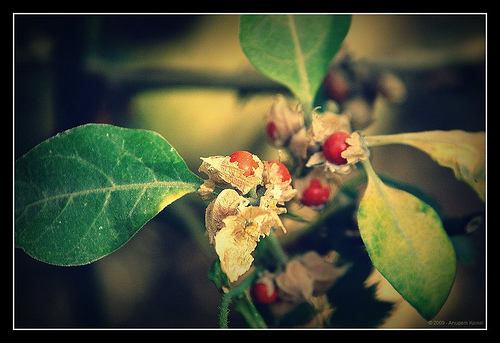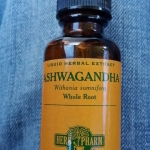Ashwagandha root is known as “Indian Ginseng”. In Ayurvedic medicine it is considered an adaptogen that facilitates learning and memory. In a 1993 clinical study in India, fifty people complaining of lethargy and fatigue for 2 to 6 months were given an adaptogenic tonic made up of eleven herbs, including 760 mg of ashwagandha, once a day.
How it Helps?
The populace had not responded to a vitamin and mineral supplement each of them had taken for at least 2 months, and they had no recognizable disease. After 1 month of taking the ashwagan*dha mixture, the patients reported an average 45 percent improvement in their moods. Their blood plasma protein levels and hemoglobin, two factors used to measure overall health, also increased significantly, providing a statistical measurement of the tonic’s effect.
Study Says..
Another study in 1995 in India found that ashwagandha was beneficial in treating the exceedingly stressful withdrawal from morphine addiction. A 1994 study in India compared the adaptogenic and anabolic (ability to promote growth of lean body mass) effects of P. ginseng and ashwagandha in mice and rats. Groups of six mice were fed 100 mg/kg water extract of either ginseng, ashwagandha, or saline for seven days.
It can change our life
On the eighth day, the animals’ endurance levels were tested by swimming. Their average swimming times in minutes were 62.55, ginseng; 82.14, ashwagandha; and 35.34, saline. In another experiment, three groups of six castrated rats were given ginseng, ashwagandha, or saline at a rate of 1 g/kg of body weight for seven days. The anabolic steroid Orabolin was given at a rate of 100 micrograms to a fourth group.
Rats taking Ashwagandha
Those rats taking ashwagandha and ginseng showed significant increases in total body weight and dry thigh muscle weight, with results only slightly below Orabolin. It must be noted, however, that in both these experiments the dosages were quite large compared with the typical human dose and it may be unsafe for humans to take such large doses of these herbs on an extended basis.
Most vital herbs
Ashwagandha, one of the most vital herbs in Ayurvedic healing, has been used since ancient times for a wide variety of conditions, but is most well known for its restorative benefits. In Sanskrit ashwagandha means “the smell of a horse,” indicating that the herb imparts the vigor and strength of a stallion, and it has traditionally been prescribed to help people strengthen their immune system after an illness.
Indian ginseng
In fact, it’s frequently referred to as “Indian ginseng” because of its rejuvenating properties (although botanically, ginseng and ashwagandha are unrelated). In addition, ashwagandha is also used to enhance sexual potency for both men and women. Belonging to the same family as the tomato, ashwagandha (or Withania somnifera in Latin) is a plump shrub with oval leaves and yellow flowers. It bears red fruit about the size of a raisin. The herb is native to the dry regions of India, northern Africa, and the Middle East, but today is also grown in more mild .
Ashwagandha Scientific Research
Ashwagandha FruitAshwagandha contains many useful medicinal chemicals, including withanolides, (steroidal lactones), alkaloids, choline, fatty acids, amino acids, and a variety of sugars. While the leaves and fruit have valuable therapeutic properties, the root of the ashwagandha plant is the part most commonly used in Western herbal remedies.
Reseaches Tells
Medical researchers have been studying ashwagandha with great interest and as of this date have carried out 216 studies of its healing benefits, summarized below: confers immune system protection combats the effects of stress improves learning, memory, and reaction time reduces anxiety and depression without causing drowsiness stabilizes blood sugar lowers cholesterol reduces brain-cell degeneration contains anti-malarial properties offers anti-inflammatory benefits.
Growth of cancer
Some studies have also found that ashwagandha inhibits the growth of cancer cells in small animals, but further research is needed to determine whether the herb prevents the development of tumors in human beings.
Ability to Calm
Ashwagandha in particular is known for its ability to calm, and some research indicates this herb can be used to promote sleep. In Texas, researchers noted the similarities in the sleep-inducing properties of ashwagandha and the calming effects of the well-known amino acid GABA. Likewise, ashwagandha has also been shown to ease anxiety or restlessness, as well as to reduce the symptoms of drug withdrawal. Its ability to stabilize moods and encourage adrenal recovery is highly valued by many herbalists.
Ashwagandha extend more
But the benefits of ashwagandha extend far beyond mood. In India it is also used to help older patients with mental agility, cognitive ability, and memory. It is also known for its ability to fight off cold and cough symptoms. Preliminary studies give researchers reason to feel that ashwagandha also has the potential ability to decrease cancer cells without adversely affecting healthy cells.
Ashwagandha red plant Ashwagandha is also considered by many to be an anti-aging supplement, and it traditionally was known for its ability to provide nourishment to bones and muscles. Studies have also shown that the orange berries from the ashwagandha can be used topically to aid carbuncles, skin ulcers, and tumors. Further research looks to determine its effectiveness as a treatment for bone cancer, diabetes, bipolar disorder, constipation, impotency, rheumatism, nerve problems, memory loss, arthritis, and many other physical ailments. Its effectiveness is thought to be similar to the herb ginseng used by the Chinese.
Ashwagandha Uses & Effectiveness
Tumors Tuberculosis. Liver problems Swelling (inflammation) Ulcerations Stress Inducing vomiting Altering immune system function Preventing the signs of aging Fibromyalgia Infertility Ashwagandha Practical and Precautions
Recommended dose
The usual recommended dose is 600 to 1000 mg, twice daily. For people who suffer from insomnia and anxiety, having a cup of hot milk that contains a teaspoon of powdered ashwagandha before bedtime is beneficial. In extremely large doses, ashwagandha has been reported to induce abortions in animals. Although no similar studies have been carried out on humans, women should avoid the herb during pregnancy.You should consult your ayurvedic doctor or other health care professional before starting on any ayurveda treatment.
Ashwagandha Side Effects & Safety
Ashwagandha is POSSIBLY SAFE when taken by mouth short-term. The long-term safety of ashwagandha is not known. Large doses of ashwagandha might cause stomach upset, diarrhea, and vomiting. It’s not known whether it’s safe to apply ashwagandha directly to the skin.
Special Precautions & Warnings:
Pregnancy and breast-feeding: Do not use ashwagandha if you are pregnant. It is rated LIKELY UNSAFE during pregnancy. There is some evidence that ashwagandha might cause miscarriages. Not enough is known about the use of ashwagandha during breast-feeding. Stay on the safe side and avoid use.
Stomach ulcers
Ashwagandha can irritate the gastrointestinal (GI) tract. Don’t use ashwagandha if you have a stomach ulcer. “Auto-immune diseases” such as multiple sclerosis (MS), lupus (systemic lupus erythematosus, SLE), rheumatoid arthritis (RA), or other conditions: Ashwagandha might cause the immune system to become more active, and this could increase the symptoms of auto-immune diseases. If you have one of these conditions, it’s best to avoid using ashwagandha.
Surgery
Ashwagandha may slow down the central nervous system. Healthcare providers worry that anesthesia and other medications during and after surgery might increase this effect. Stop taking ashwagandha at least 2 weeks before a scheduled surgery.







Leave a reply